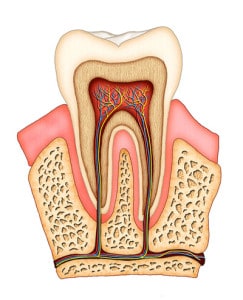Single Visit Root Canals In Toledo & Sylvania
Dental Office Located in Sylvania

After a patient has a root canal with one of our doctors, we often hear: “Wow, is that all there is to it?” While no one looks forward to a root canal, our dental team goes out of the way to make sure that you are completely numb and comfortable for your procedure. We also use that latest technology to ensure the highest success for your root canal. Dental Health Associates is happy to offer a single-day root canal procedure that will make it easier for you to get on with your life. We believe that maintaining your own natural teeth is the best way to maintain oral health. Whatever procedure you may need, you can rely on Dental Health Associates for your dental health. Remember, it never hurts to smile at Dental Health Associates! Contact Dental Health Associates at our Sylvania office today for your free consultation.
What Is A Single-Visit Root Canal?

Traditional endodontic therapy is divided into multiple visits to clean and seal the affected tooth root and canal system. That process uses calcium hydroxide between appointments to prevent bacteria from returning. Our Sylvania office offers single-visit root canal treatment to clean, shape, and obturate (filling and sealing the tooth with puddy-like material) the affected area in a single treatment session.
Root canal therapy involves these steps, which may be performed at separate appointments or one visit to Dental Health Associates.
- One of our experienced dentists opens the back of the tooth, which may be a front tooth, molar, or premolar. They remove the infected pulp and clean the pulp chamber and root canal. The whole nerve space of the tooth is treated and shaped to prepare for the next step.
- Gutta-percha is a rubbery, thermoplastic material inserted into root canals to fill the space. It’s heated and compressed to fit into the root canal and pressed against the canal walls to ensure a tight seal that protects against infection. Dental cement seals the root canal to prevent bacteria and re-infection. Composite material is used to fill the damaged tooth area.
- A customized dental crown is fitted over the remaining tooth structure to protect the vulnerable tooth and root system.
The aftereffects of root canal therapy are typically mild if you follow the recovery instructions. Our dentist may prescribe an antibiotic to treat or prevent infection while your tissues heal. You may experience some minor discomfort and soreness, but patients often report feeling better because the toothache caused by the infected pulp is gone. Over-the-counter medication or prescribed pain medicines can ease your discomfort.
Benefits of Single-Visit Root Canal Treatment
The single-visit root canal is often the preferred approach for our dentists. Streamlined and traditional root canal therapy have similar success rates, but single-visit root canals offer additional advantages, including:
- Patients find single-visit root canals more convenient because the treatment requires just a few hours away from their office or home.
- Single-visit root canals use fewer dental materials with fewer dental visits, which may reduce the cost of the treatment.
- Traditional root canals may carry the risk of microleakage between office visits, which can cause re-infection between the cleaning visit and the appointment to fill the space; single-visit root canals clean, fill, and seal the canal at once, reducing the risk of leakage.
- Most patients qualify for single-visit root canals, though it may depend on the tooth’s anatomy and other factors.
Warning Signs You Need a Root Canal

Persistent tooth pain is one of the hallmark symptoms of a damaged root system. You may need a root canal if you have a chipped or cracked tooth, cold or heat sensitivity, dark tooth discoloration, swollen gums, and long-term tooth sensitivity when pressure is put on the tooth. Those symptoms indicate deep tooth decay that requires removing the infected tooth pulp and cleaning and filling the canal space.
Severe tooth discoloration can sometimes be caused by nerve damage under the tooth’s surface. A neglected cavity can spread into a tooth’s nerve and root system, requiring a root canal and dental crown to save the tooth.
What Happens If I Don’t Have a Root Canal?
Avoiding dental treatments causes a further decline in oral health and may impact your overall health. A root canal removes infected tissues and prevents infection from growing. If you need a root canal and put off the treatment, the infection can spread to your jaw, causing you to lose the tooth and a portion of your jaw. The infection may develop into an abscessed tooth and require a tooth extraction. All this tooth, bone, and tissue damage and infection can lead to life-threatening concerns, including sepsis, heart attack, and stroke. Not to mention the excruciating pain you will likely experience throughout this process.
Root canal treatment is necessary for severe tooth decay and root canal damage. This procedure saves the tooth from extraction and stops the infection from spreading. It’s often the best route to restore your oral health. It’s best not to put off dental work or risk more costly and invasive procedures later on.
If you’re experiencing ongoing tooth pain or other symptoms, contact Dental Health Associates to schedule a dental exam and restore your oral health. Contact our dental office in Sylvania, Ohio, at (419) 882-4510 or email us.


